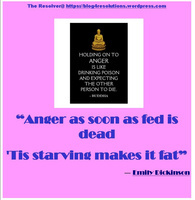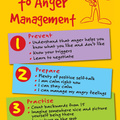Enjoy being online again!
Welcome to the community of good people who base their values on evidence and appreciate civil discourse - the social network you will enjoy.Create your free account
6 comments
Feel free to reply to any comment by clicking the "Reply" button.In my experience, the hatred I had for myself was probably the cause for most of my outward anger. It took a private, solitary, emotional breakdown that very few people know about (no one in my family) for me to realize that. I'm not sure I can think of a scenario where true anger would not somehow be rooted in fear.
When you write "I'm not sure I can think of a scenario where true anger would not somehow be rooted in fear," I see that you've discovered the first step to managing anger. Accepting that fear is the cause of anger is an incredibly positive perspective, which can save you much pain and in extreme cases, your good health.
Whenever i feel my body sending me signals that anger is percolating; like blood rushing to my face, a tightening stomach, or heart palpitations, I accept that i'm experiencing the warning stress-signals which i need to address; i need to know what i'm afraid of if i'm going to resolve my fears. Avoidance rarely works unless the fears are unfounded, which is when i know that my worries are a misuse of my imagination.
So the first question i ask myself when i sense those signals is "What am i afraid of losing?" Losing face, potential humiliation, a threatened ego-generated self-perception, or the threat of losing a loved one figuratively or realistically can all generate anger. When someone we care about dies, anger is always a component of our grieving process.
I wish you well with your new-found reflective tool.
I believe that self-loathing almost always results in outward anger. Similarly, consistent outward anger creates unpleasant experience for the expresser, as well as for the recipients -- and the angry one knows that he or she is the source of the discomfort.
Sometimes the outward anger comes from an inward buildup, especially if the anger is toward a person you have to tiptoe around. Then you end up blowing up at that person and it's never pretty.
Vocalising anger is healthier than not vocalising it.
That's exactly what Emily Dickensen meant. And is often true and effective.
Whenever I have flared up in anger I have later suffered. I don’t think the anger got directed inward though—we can’t hurt another person without hurting ourselves because at heart we are connected.
IMO, the cause of anger is a judgmental or untrue thought that we have fed into our subconscious mind. Stop doing that and you won’t be angry.
Anger is always fear-fuelled; fear of rejection, humiliation, loss, or anything which makes a person emote. So as you say, if we figure out what we're afraid of, we could dissipate our anger. That's the theory, but nothing is always and sometimes it takes more time, effort, or knowledge than a person has, alone.
Enjoy being online again!
Welcome to the community of good people who base their values on evidence and appreciate civil discourse - the social network you will enjoy.Create your free account
Share this post
Categories
Agnostic does not evaluate or guarantee the accuracy of any content. Read full disclaimer.









